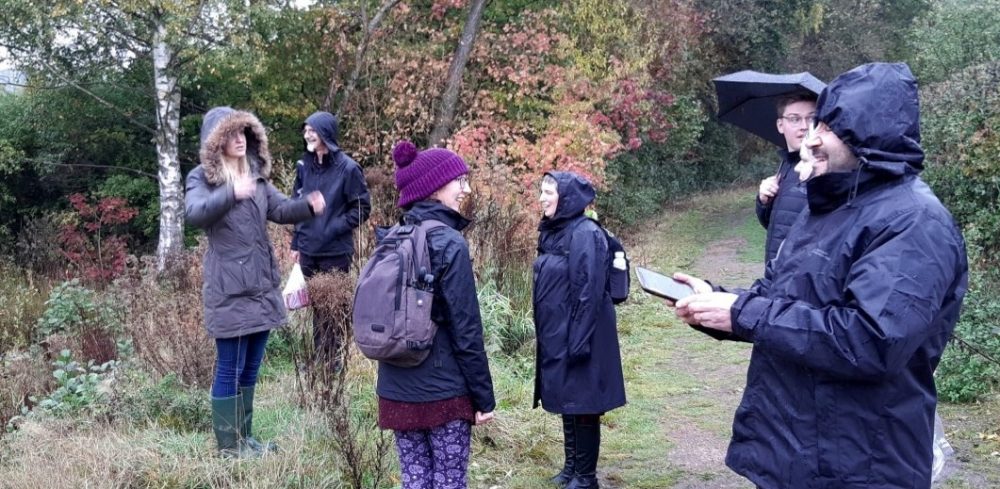This is the second in a special series of blog posts, in which I talk to University of Staffordshire colleagues about their impactful public engagement activities. Introducing Dr Paul Mansell, Lecturer in Sport and Exercise Psychology, sharing his experiences of producing the ‘Performing Under Pressure’ podcast. Do click on the link at the end to subscribe to the podcast if you’re curious to find out more!
- What is ‘Performing Under Pressure’, how did it come about, and what is your role in it?
I’m part of a team of University of Staffordshire researchers focusing on enhancing individual and workplace psychological health. Two key frameworks that we utilise in our work are The Theory of Challenge and Threat States in Athletes and Social Identity Leadership. We undertake impactful research in sporting, occupational and educational settings, and we wanted to provide a platform for people who successfully perform under pressure to share their stories and hopefully influence and inspire others.
Producing the podcast at the University of Staffordshire not only allows us to utilise professional media facilities, but also ensures that the podcasts are underpinned by research and have academic credibility. I’m the podcast co-host, along with Professor Matt Slater. We also have contributions from a wider staff team, (Dr Andrew Wilkinson, Dr Katie Sparks, Dr Karla Drew, Dr Joe Dixon and Jack Bullock) and technical support from Liam Kelsall. We’ve recorded over 30 podcast episodes so far (July 2024) and have more in the pipeline. So far, (July 2024) we have had about 2500 downloads of episodes in around 50 different countries.
- What are the main challenges that your podcast addresses?
In a nutshell, psychological stress is a leading public health problem that can affect anyone and can lead to long-term health issues. We’re passionate about addressing this problem and helping people to find better ways to perform under pressure.
- Can you give some examples of how Performing Under Pressure has made a difference?
The knowledge exchange that happens through the podcast is incredibly helpful. As researchers, we are learning all the time from our guests, and this goes on to inform our interventions in schools or when working with athletes. Often, it’s the little phrases that guests use when talking about stress – ones that I hadn’t thought of before. We were recently joined by Meg Baldwin, broadcaster and captain of Port Vale Women’s Football Club. She said, ‘I often don’t like stress, but I still welcome it anyway’. And now I’m trying to make that distinction when I work with young people, to encourage them to see that stress is still useful, even if they don’t like it.
The podcast also leads to new connections, which in turn can lead to new projects. For example, we got to know four recently retired footballers [Matt Jarvis, Sam Winnall, Mark O’Brien and Jake Jervis], who were recent podcast guests; this led to a new project with Wolves Football Club and the University of Wolverhampton, involving a season-long intervention with Academy football players. A connection with another guest led to us delivering a workshop for Sheffield United Football Club.
Many inspiring speakers on the podcast are local people, such as an outstanding local head teacher (who is one of our alumni), and a local senior police officer. We also like to include University of Staffordshire students or alumni, who have often achieved amazing things. We have featured one of our former master’s students who is a Sports Psychologist from Uganda, supporting the Ugandan team through their first Cricket World Cup. We have recently recorded an episode with an Olympic Gold Medallist who is also doing a master’s degree with us at Staffordshire.
As well as the local connections, we have been able to include international contributions, such as a neuroscientist from Australia and ‘the world’s leading expert on the psychology of penalties’ from Norway. And we have raised awareness of issues that are often ignored, including menstruation for women athletes. Our podcast is also a platform for competitive athletes with disabilities to share their thoughts and experiences, such as an England Cerebral Palsy footballer.
Guests report that they welcome and value the rare opportunity to spend 90 minutes or so reflecting on their experiences and sharing their insights. Sometimes guests have experienced major life challenges, such as poor mental health or addictions, and are looking to support and influence others who may be going through the same. We’ve also seen positive impact for students who have co-hosted podcasts, gaining confidence and new skills.
- What do you think the future holds for Performing Under Pressure and what does success look like?
We plan to keep producing new episodes, and responding to the new initiatives that emerge from the conversations. We’ve also just signed a book contract to write about the results and insights from the podcasts, so that’s exciting and will help us to reach more people and in different ways.
- How do you feel this contributes to the University of Staffordshire’s Connected Communities vision and strategy?
I think that the podcast fits well with the goals and ethos of Connected Communities. It’s an opportunity to welcome people onto our campus and to make use of the facilities. Each guest is an opportunity for connection and collaboration, and it’s great to be able to do that in person. It’s also a platform for people to share their stories and achievements, and a valuable way to build on our relationships with University of Staffordshire alumni. We want to show guests and listeners that as university lecturers, we’re also normal, approachable people who you can come and have a conversation with. We also see this as a great CPD opportunity for ourselves thus acting as an exchange of knowledge.
Spotify link: https://open.spotify.com/show/2UVgbxrwlSJKHax8CmsDOc?si=3af6329791004271

